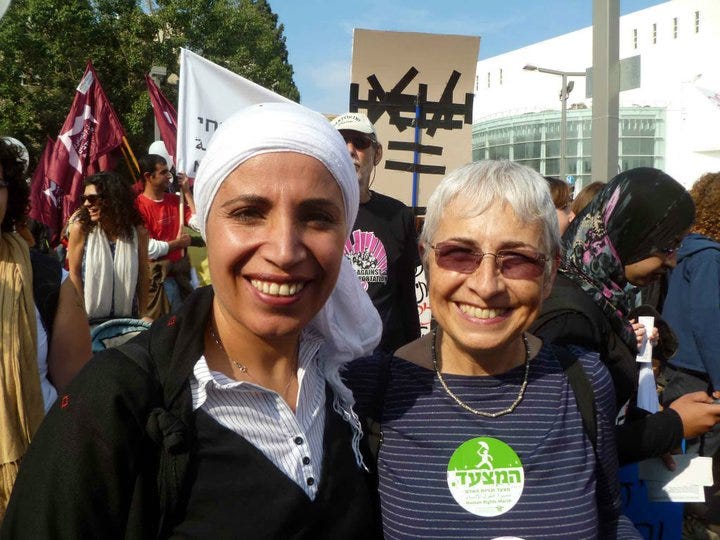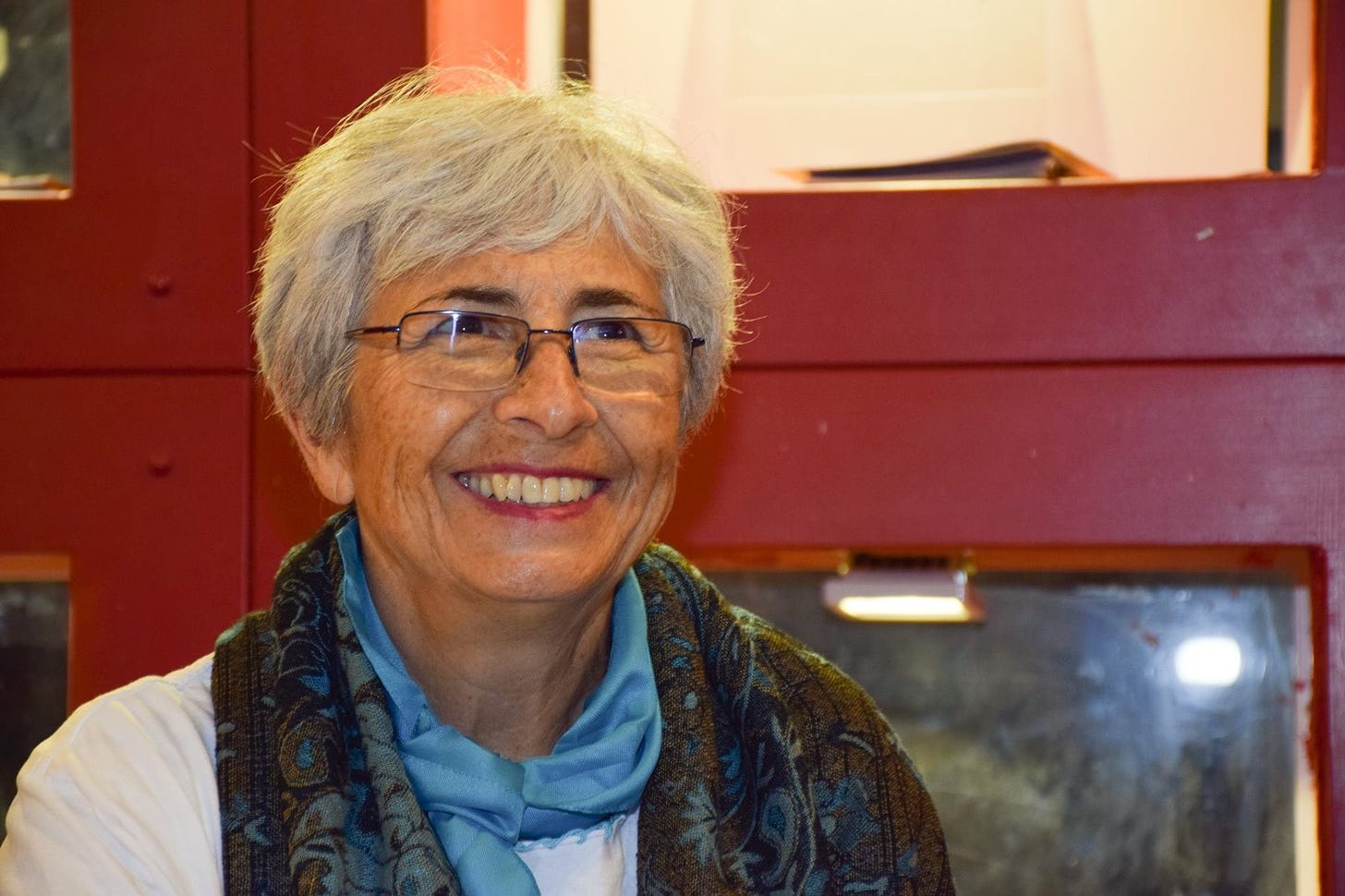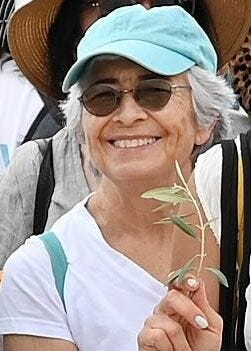'She always looked for a solution'
That's the way that Vivian Silver's grandson described the life of the social activist Vivian Silver, whose remains were identified this week, more than a month after her murder by Hamas
If you’re reading these words, you probably have already heard of Vivian Silver, at least in the month since October 7, when she could not be accounted for after the attack by Hamas on Kibbutz Be’eri, her home on the border with Gaza. Vivian, a Canadian-born 74-year-old who had moved to Israel in 1974, had been on the phone much of the morning reporting to family and friends on what was happening outside. And she understood, while she took cover in her apartment’s safe room, and heard the sounds of the terrorists growing louder, that they would be coming for her at some point. So, she took her leave from family members by phone, even as she joked that next time she would make sure to bring a knife with her into the safe room. Even as she tried to fight the invaders off, the phone line remained open, before being cut off abruptly.
But as the days and weeks following October 7 passed, and she was not identified among the victims who were killed at the kibbutz, the hope that she might be alive, among the hostages taken back to Gaza by Hamas, grew. This past Monday night, however, Vivian’s family was informed that her remains had been identified, and that it was possible to determine that she had been killed on the day of the attack itself
Why it took more than five weeks to make a positive identification (by means of DNA testing) is something I prefer not to speculate about, but we do know that Be’eri, where she had made her home since 1990, endured one of the cruelest beatings among the communities attacked that day. More than 80 residents of the kibbutz (which had a prewar population of about 1,200) were killed, and nearly 30 are believed to among the approximately 239 in Hamas captivity. The physical damage to the community and its structures was devastating, and for those who were fortunate enough to survive, the psychological toll of the siege, which went on for some 27 hours, is beyond imagining.
Vivian Silver was a lifelong activist on behalf of social justice, which in her case was focused on both feminism and Israeli-Palestinian reconciliation. There are surely people for whom her death at the hands of Palestinian militants only serves as ironic confirmation that she was misguided and naïve in that work. I didn’t know Vivian personally, but I would guess that, were she able to speak with us today from the other side, she would tell us that she is more convinced than ever that Palestinians and Israelis can and must find a way to live together, otherwise they will completely destroy themselves and each other.
If you read her life story – in places like Haaretz and the Canadian Jewish News and in her own words on the Women Wage Peace website – it is clear that she was both an idealist and a highly practical woman -- a great combination of qualities for someone who wants to effect change.
Silver was born in 1949 in Winnipeg, Canada, but after returning from a junior college year in Israel, she decided she was going make her life there. She joined a garin (“core” settlement group) that was given the mission of reviving Kibbutz Gezer, near Latrun, which had been founded in 1945 but subsequently failed. The group arrived there in 1974.
Her life from that point was characterized by constant political and social activity, often in leadership roles. Vivian’s egalitarian impulse led her to push the kibbutz movement to make good on a 30-year-old commitment to guarantee that women filled at least one-third of all leadership positions, which was not as simple a task at one might have hoped. Eventually, the movement recognized the gap between its own principles and the reality, and adopted the one-third rule, at least on paper. During her years at Gezer, Vivian served as kibbutz secretary and also headed up its construction committee, a position she also held at Be’eri, where she and her husband, Lewis Zeigen, and their two sons moved in 1990, at least in part because of Gezer’s ongoing economic problems.
Living in the Negev, perhaps it was natural that Vivian would become involved in working on behalf of the most impoverished and neglected population in Israel – the Bedouin. Much of her work, particularly through AJEEC-NISPED (the Arab-Jewish Center for Empowerment, Education and Cooperation and Negev Institute for Strategies of Peace and Development), which she co-directed with Amal Elsana Alh’jooj, was focused on such things empowerment projects and job creation, and also, until the second intifada began in 2000, joint projects with Palestinians in Gaza. These are only a fraction of the organizations she worked with.

When Silver retired from AJEEC-NISPED, in 2014, she turned her attention to peace activism, with the newly founded Women Wage Peace, whose aim was to engage women in accomplishing what men had failed so miserably at over so many decades: forging a political agreement between Israelis and Palestinians, something that today looks as remote as ever.
When one of Vivian’s grandsons, Shneur Zeigen, spoke with TV Channel 13 on Tuesday, less than 24 hours after confirmation of her death was received, he was asked what he thought she would have to say about the obvious gap between her aspirations for peace between the two peoples and the ignominious manner in which she met her death. Rather than answering that directly, Shneur said that he though his grandmother would appreciate how Israelis, including himself, were now beginning to take responsibility for the country’s situation, something Vivian had always tried to do. His grandmother, he said, “always acted to arrive at a solution. And I think that this is what we are starting to do today. To work toward a solution.”
On Monday night, shortly before confirmation that Vivian had not survived on October 7 reached her family, I attended a meeting in Jerusalem of the national organization Standing Together (Omdim Beyahad, in Hebrew), which brings together Jews and Arabs to work on subjects of import to them both – labor issues, environmental sustainability, housing, to name a few. So many people showed up at the Jerusalem meeting (about 400, claims the organization) that half of them had to view the speakers on a screen in a separate hall. Not to mention that that same evening, another Jewish-Arab group was meeting across town to talk about cooperation on matters related to social media.
Israelis have a government that thrives on sowing hatred and strife between Jews and Palestinians, both internally and in the territories. The fact that this horrible war has not been accompanied by the kind of intercommunal violence that there was during the 2021 flare-up with Hamas can be attributed at least in part to individual citizens’ refusal to give in to incitement – to “take responsibility” for their own lives and future, as Shneur Zeigen put it. It’s a small victory for the cause of peace and justice, and it’s one that, at least in part, can be added posthumously to Vivian Silver’s glorious C.V.



